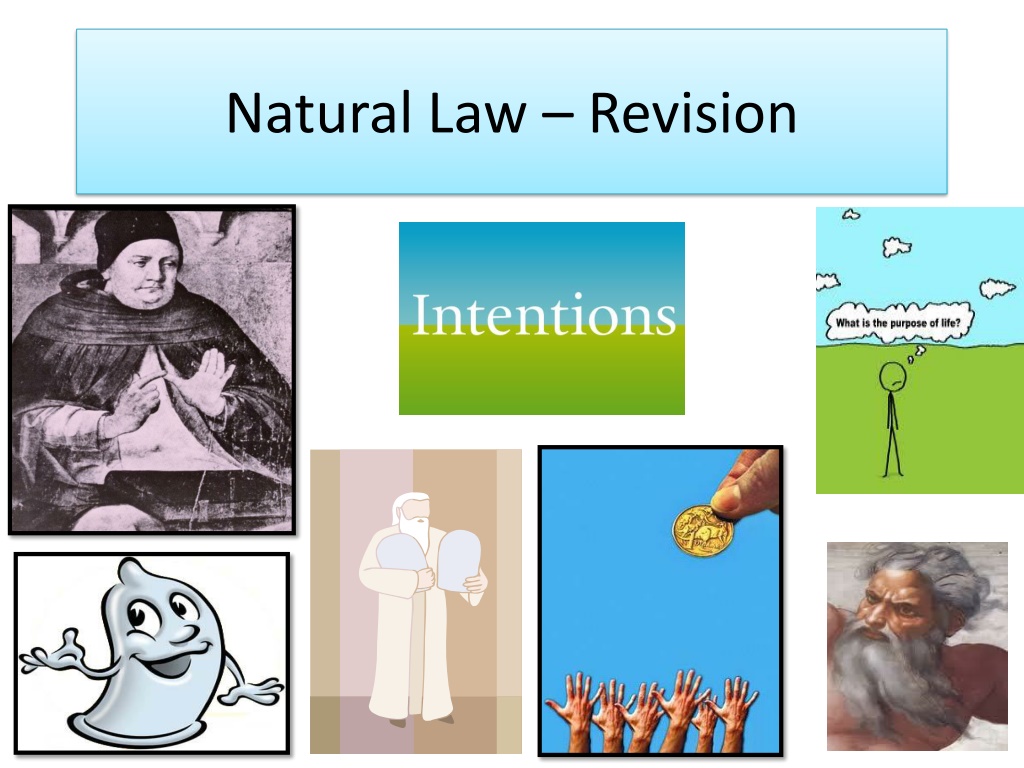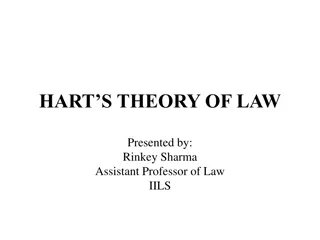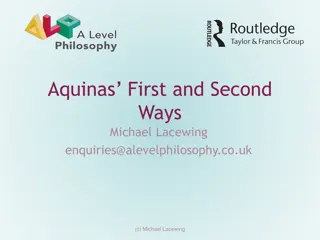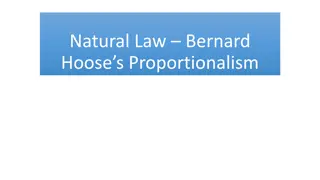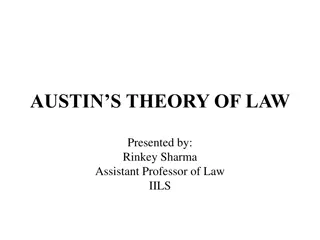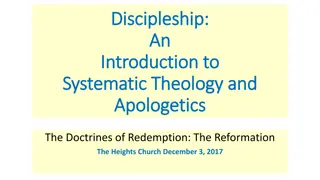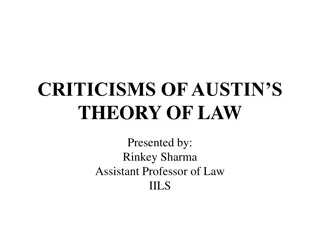Understanding Natural Law Theory: Aquinas's Perspective
Natural Law Theory, influenced by Aristotle and Christian ethics, asserts that there are universal norms based on intrinsic goodness. Aquinas emphasized the importance of human rationality, linking reason to moral precepts and virtues. The theory promotes the idea of a final purpose for humans and the pursuit of eudaimonia. It is rooted in absolutism and deontology, emphasizing adherence to objective moral law regardless of circumstances.
Download Presentation

Please find below an Image/Link to download the presentation.
The content on the website is provided AS IS for your information and personal use only. It may not be sold, licensed, or shared on other websites without obtaining consent from the author. Download presentation by click this link. If you encounter any issues during the download, it is possible that the publisher has removed the file from their server.
E N D
Presentation Transcript
The spec What you need to know Main features of the theory That it is absolutist and deontological The relationship that Aquinas said existed between the four levels of law The importance Aquinas placed on human rationality How reason links to the primary and secondary precepts How Aquinas believes that humans have a final purpose The types of virtues within natural law The difference between interior/exterior acts The difference between real/apparent goods and how these relate to sin How to apply Natural Law to situations and examples How Natural Law is compatible with one major world religion Be able to evaluate these issues
Absolutism & Deontological Absolutism Laws are the same regardless of the situation. There are universal norms. Deontological Acts are intrinsically good good within themselves. You don t commit an action for the consequences. Legalism The idea that people should obey religious laws in order to be good.
Happiness and Eudemonia Aristotle believed there was a law written in nature for humans to know how to act morally He believed following these laws would lead to Eudemonia Aquinas was influenced by this, and believed that humans lean towards the good Aquinas believed that eudemonia would be a reward in heaven for good actions on earth
Background The Stoic philosophers emphasised the importance of rationality in the working of the world. Cicero: True law is right reason in agreement with nature . However, it is best known as a Christian system of ethics. The Bible hints at such ideas; St Paul argues that some morals are known from nature (Romans 1).
Purpose Aquinas was also influenced by Aristotle s belief that all humans have a purpose For Aquinas, this was a GOD GIVEN ideal purpose. Similarly to the parable of the talents, Aquinas believed we have God given purposes and talents For Aquinas, fulfilling our purpose will lead us to the final cause What is our final purpose? the requirements of the law are written on their hearts, their consciences also bearing witness St Paul in Romans 2
Reason and Rationality Again, similarly to Aristotle, Aquinas believed that all humans possess the unique ability to REASON. This GOD GIVEN REASON helps humans identify how to act morally The use of our reason reveals to us the ultimate goods in life. Aquinas believed that Natural Law itself had four characteristics: God created the world and established and order, pattern and purpose within it that reflected his will everything is created for a purpose and human reason reflects that purpose and enables people to judge how to act in order to conform to that purpose an act is not good because of its consequences; it is good in itself, even if it leads to suffering.Natural Law can be worked out by anyone, whether they are religious or not. The moral life is the life according to reason - Aquinas
The 4 Laws Natural Law is split up into 4 channels: Eternal Law: God creates everything and his will and wisdom is revealed to us through... Divine Law: the sacred text and teachings of the Church, which are made known through... Natural Law: the innate human ability to know what is naturally right. From which... Human Law: is derived eg laws found in the legal system HIGH GRADE: Gerard Hughes says in the Cambridge dictionary of philosophy that it is through natural law in which humans are made distinct to everything else in the natural world i.e. animals
Primary and Secondary Precepts The primary precepts help us to identify our GOD GIVEN purposes in life. They identify which actions are good and are absolute. They are: To worship God To live in an ordered society To reproduce To learn To defend the innocent (to live)
Primary and Secondary Precepts Secondary precepts are laws made to uphold the primary precepts. Unlike primary precepts, they are not absolute and can change in certain situations. For example, Polygamy and Monogamy both lead to reproduction and are both secondary precepts, despite being different
Virtues Aquinas said that there is a link between happiness and virtuous behaviour Virtues represent the human qualities that reason suggests help us to live a moral life The four cardinal virtues are what Aquinas believed were necessary for the basis of a moral life. They are: Prudence, Justice, Fortitude and Justice
Virtues There are also three revealed virtues that we access, not through reason, but through Holy Scripture. These have been revealed to us in the Bible. Faith, Charity, Hope.
Interior and exterior acts As Aquinas was a deontologist, it acts were important to him, as he believed that acts are in themselves good or bad. Interior acts: The intention behind the act Exterior acts: The act that is preformed To be truly good and glorify God, BOTH the interior and exterior acts must be good. High Grade: The principle of double effect
Real and Apparent Goods Aquinas assumes that human nature is essentially However, if humans all naturally seek what is good, then why do they sometimes choose what is bad? He solves this problem by drawing a distinction between real and apparent goods: what is actually good and what only seems good. good. A moral error involves choosing an apparent good, mistakenly supposing that it is really good. If I eat ten hamburgers, I may think it s good because I ll enjoy it. However, it is not a real good, because rational reflection will show that it will make me fat and depressed. The same would be true for stealing cars, adultery, etc. They might seem good, but they re not.
Real and Apparent Goods Aquinas believed that humans often sin or fall short of nature He believed that they do this because they confuse real with apparent goods A real good: is a characteristic which will help people become closer to God An Apparent good: is one in which sin takes people further away from God s will with apparent goods Examples: Apply this to same sex relationships
How it is compatible with religion 1. God made the world and a sense of order within it 2. It should be the goal of every human being to return to God 3. The primary precepts reflect the main purposes for humankind as outlined in religious scriptures 4. People sometimes fall short of God s purposes and sin (John 8) 5. God creates all that exists, including eternal law which is revealed in Divine law. There are examples of religious rules in the Bible (Exodus 20) 6. The motive for committing an act is important as well as the act itself (Matthew 6)
How it isnt compatible with religion 1. It is based on reason and not love. Jesus, however, told people to Love one another as I have loved you (John 13) 2. Jesus said good actions should not be done for reward but for their own sake. 3. Some religious denominations i.e. the Quakers, reject the use of absolute rules 4. Some believers reject the existence of a universal human nature gay believers would argue that they were created this way by God 5. Joseph Fletcher argued that Jesus was opposed to legalism 6. It can conflict with some moral teachings, for instance turn the other cheek in natural law you would break the teaching in order to preserve one s own life
Evaluative issues Examiners are looking for quality and not quantity in AO2. They want to see you evaluate and analyse the fors and againsts rather than simply list a few of them. Common mistakes need to be avoided: Don t just answer AO2 as strengths and weaknesses Don t list evaluate Add a conclusion
Strengths of Natural Moral Law Certainty: Being an absolutist system, it is a source of clear values and moral certainty. Universalism: Its focus on reason allows it to transcend the differences between cultures and focus upon common moral ideas shared by many. Purpose: Its emphasis upon the purpose of humanity gives people structure and meaning in their lives.
Weaknesses of Natural Moral Law No agreed moral law: a relativist objection. The world is full of different moralities, not clear and common ethics. No such thing as essential human nature: so argues the philosopher Kai Neilson. Science gives no justification for the view that humans have the same natural inclinations. Legalistic morality: the unbending absolutism of NML means that it is not understanding of individual circumstances.
